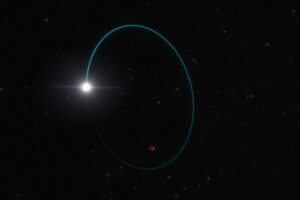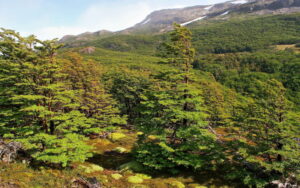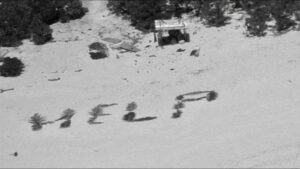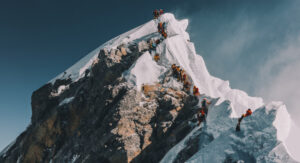For more than 10 years, Miriam Lancewood and Peter Raine lived free from society as hunters and gatherers in New Zealand’s remote mountains. They survived happily without timepieces or timetables, but now the couple have to adapt to the changes wrought by time.
Their story is almost unbelievable. They grew up more than 18,000km apart, Raine in rural New Zealand, the son of a sheep farmer. Lancewood (her pen name) was born three decades later in the Netherlands, the middle of three siblings born within three years.
Lancewood’s home was lovingly filled with music and theatre. In adolescence, her athletic career took off. For six years, she represented her country in pole vaulting and competed in the youth Olympics. She established a fitness acumen that helped her for years, and not just in sport. At the same time, she learned early the perils of a full schedule.
Revolt against scheduling
“My life in the Netherlands was based on time, running around the clock, jamming my studies and training and seeing friends, all in one day. It was stressful,” Lancewood told ExplorersWeb. “But because it is so normal in modern society, I never questioned it.”
Her parents introduced her to the joys of nature. Sometimes they camped wild near a river, sleeping under the stars. “That, I loved,” Lancewood recalls. “I always dreaded going back to my flat and crowded home country.”
By contrast, Raine spent much of the 1970s living in the forest, protesting against commercial logging operations, which were a national concern in New Zealand back then. He bought land on the West Coast, preparing for a nuclear apocalypse which never came. He married and studied for a Ph.D. in environmental studies.
Shaped by the philosopher Friedrich Nietzsche, Raine believed that people didn’t need government or authority for survival. When Raine encountered Raimon Panikkar’s Cosmotheandric Intuition (a theory that dissolves the idea of separate realities between man, God, and world), his view on reality transformed. He quit his job as a university professor in New Zealand and moved to India to live like a “modern nomad”. That’s when Raine and Lancewood’s worlds collided.
Lancewood had just completed her university degree and was in India after a year in Zimbabwe. With a chessboard under her arm, she was looking for company when she met Raine in a local chai shop.
Thirty-year age difference
The connection was instantaneous. The 30-year age difference was no barrier. His stories of adventure captivated Lancewood. What Raine had in intellectual curiosity, she complimented with physical prowess.
Despite inner words of caution, Lancewood moved in with Raine the following day. The pair then spent years traveling together through India, climbing mountains, and exploring South East Asia and Papua New Guinea. Eventually, they settled in Marlborough, at the top of New Zealand’s South Island.
They briefly settled into a house. Lancewood taught phys ed for at-risk youth while applying for New Zealand residency. But they soon knew that this wasn’t a lifestyle they aspired to.
They decided to see how they would cope with living in the wild, away from society. They sold their belongings and headed into the mountains, armed with little more than a tent and bow and arrow.
“We spent a lot of time tramping in the wilderness, but then we decided we wanted to be a part of it, not just observers. We decided to spend four seasons [there] and see how we’d survive,” says Lancewood.
Seven years in the bush
The experiment lasted seven years.
“We saw no reason to come back to town or to settle. We felt completely at ease in the wild mountains of New Zealand. Sometimes we didn’t see anyone for months,” Lancewood recalls. “I never missed anything.”
I can’t help but be enthralled by Lancewood and Raine. New Zealand has plenty of self-sufficient, off-grid stories, but Lancewood and Raine’s style is vastly wild and authentic.
Outwardly, they embody health. There’s no strain or sadness shown on their faces. No filth in their clothes, although Lancewood promises that all their belongings smell of campfires.
They lived in small, compact tents. Their few possessions fit into one backpack each and they spent their days hunting and gathering. In a bit of a gender turnaround, Lancewood took responsibility for hunting while Raine cooked and gathered wild food.

Miriam Lancewood and Peter Raine spent more than seven years living in the New Zealand wild.
Hunting hare and possum with a bow
For the first two years, Lancewood hunted exclusively with a bow and arrow. She mostly stalked hare or possum (an unprotected animal in New Zealand), which were easy to carry back to camp. Later, she acquired a rifle.
When they first entered the bush, they left their pasts behind and had no plans for the future. They said goodbye to schedules and calendars. Not knowing what time, day, or month it was, they found it easier to focus on the present.
“Peter and I made a radical shift in our thinking and therefore in our life,” Lancewood said. “We went off the beaten track, to live an adventure. Not just going on a challenging holiday and returning home.
Every year, they approach their lifestyle differently to break up the monotony. One year, they walked the 3,000km Te Araroa Trail, which spans the length of New Zealand. Sometimes they spent one night in each place, sometimes four months. Occasionally helicopters dropped them food buckets in the rugged Southern Alps. It was a change from possum and a thrill to see visitors.
Lancewood isn’t like anyone I’ve encountered before. She’s a breath of fresh air. Her 38-year-old skin is flawless, without a wrinkle. Her effortless smile could appear in a toothpaste ad. Her shiny hair bounces enviably. She’s personable, grounded, and somehow relatable. When she speaks, her words make sense even to mortals like me, even though she barely spoke English when she and Raine first met.
Not for everyone
Raine worries about what will become of Lancewood when he is gone, although she certainly has a survivor mentality. In general, Raine is not as public or open as she is. Although she enjoys life without distractions, she also wants to share their lifestyle for others to learn from. Scores of people write her, saying that they want to do the same. But Lancewood knows that the challenges aren’t for everyone.
“Last summer was pretty cold,” she admits. “Sometimes it’s hard to keep warm in the snow in the mountains. Worst thing is endless rain. Our year on the West Coast was hard. Rain is no good when you live in a tent.”
To put her words into context, the West Coast is one of the wettest regions in the country. Annual rainfall regularly exceeds 10,000mm, and their lifestyle is at the mercy of the weather.
When it’s sunny, they walk, exploring lakes and waterfalls. When it’s raining, they read in their tent. During their first winter, spent up at 1,200m, even the waterfalls sometimes froze.
Lancewood says that one of the major benefits of their lifestyle has been improved senses. But learning to do nothing has been one of her biggest challenges.
“It takes about two weeks for the mind to slow down in order to meet with the rhythm of nature. And in that time, you go through a period of boredom and restlessness,” she says.
Bestselling author
In 2017, after seven years, the couple left the New Zealand backcountry. Before they left, Lancewood penned her first book, Woman in the Wilderness. It became an international bestseller, translated into five languages.
The title made her a reluctant celebrity, especially in her native country. Since then, she’s been invited to book festivals around the world, including Dubai and Hong Kong. Although the festivals are exciting, she says that she can’t ever see herself returning to life in a city.
They next flew to Europe and began a new adventure, walking 2,000 km across the continent, then on to Turkey.
Lancewood has always known that her days with Raine are a blessing. But in Turkey, the physicality of their life began to show on Raine’s then 64-year-old body.
They were having a bite to eat. Then Lancewood stood up and put her pack on, ready to continue walking. Raine didn’t do the same. The strain of shouldering his pack further was showing on his older body. When they went on to the Australian desert, things took a drastic turn.
“Peter got kidney failure in the desert in Australia,” Lancewood said. “The doctors told him to live near a hospital in town and go on dialysis. He said, ‘I rather die.’ ”
Dialysis? “I’d rather die,” he said
Medics told Raine that he had a three percent chance of survival without a new kidney. When Lancewood offered hers, he declined. They told Lancewood to say her goodbyes.
“I have much respect for Peter’s courage, he is not afraid to die,” Lancewood said.
Raine wanted his remaining time to be in the wild. A three-hour walk from cellphone coverage isn’t the smartest idea for someone with serious health concerns. So instead, they elected to recover in a hut back in New Zealand.
For the couple, the hut was restricting. Suffocating even. Diminishing their heightened senses and preventing the breeze from brushing over their cheeks.
Last November, Lancewood released her second book, Wild at Heart. It adds to her life story of living in remote areas of New Zealand and walking long routes, such as the 2,000km across Europe.
Eventually, when Raine’s health improved earlier this year, they returned to the backcountry. But they recognized that they had to adapt their lifestyle for the sake of Raine’s health.
“It’s too cold at night, even with a possum duvet and yak blanket,” says Lancewood. Even in the height of summer, they were snowed in for five days.
Raine can’t walk with a pack anymore, but they have found a new way of living.
Against medical advice, they flew to Bulgaria last year. For the summer, they lived in a shepherd’s cottage that they purchased in the Rhodope Mountains three years ago. They lived off-grid at 1,200m, a 2.5km walk from the nearest village. Their closest neighbor was a bear. A wild cat shared their hut, wolves scouted the mountains, and the couple ate from their vegetable garden.
From hunter-gatherers to nomads
Their new plan is to become nomads. Where? They don’t know yet. But Raine’s kidneys prefer warmth, especially in winter.
“One day we will end up in Tajikistan, or living in a hut in the Himalaya,” Lancewood said. “The main thing for us is to live free. To live without obligations, without many possessions. The more stuff I have, the more stuck I feel.”
Despite an innate fascination for survival in extreme conditions (Lancewood is currently reading One Day in the Life of Ivan Denisovich, by Alexander Solzhenitsyn; Raine is rereading Nietzsche), their future will likely involve buying small cottages in different countries, and moving between each. Lancewood says that although it takes more planning to live that way, they are happy, and it’s another adventure.
“Living without security is healthy for the mind,” she insists. “That is what keeps me sharp, alive, and happy. It is, by the way, also the secret for a long-lasting relationship.”






